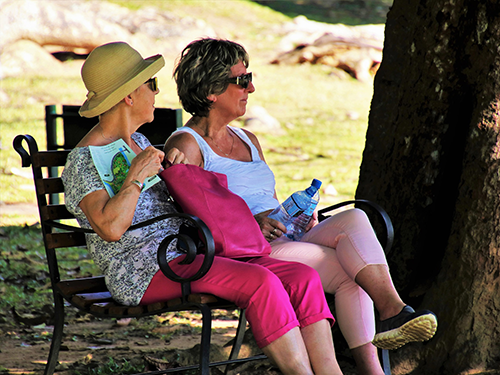Article by Abby Picard, DFS Domestic and Sexual Violence Services
(Posted 2022 April)

 Sexual violence can impact people of any age. Some older adults who experienced sexual violence as children or young adults may disclose their experience for the first time later in life.
Sexual violence can impact people of any age. Some older adults who experienced sexual violence as children or young adults may disclose their experience for the first time later in life.
Many older adults grew up with a more rigid understanding of gender roles and sexuality than younger generations. Additionally, norms around consent in previous decades often kept people from reporting their experiences, or even thinking of them as assault or abusive.
Some examples of how these ideas impact older adults may include the belief that sexual abuse or rape cannot happen between married partners or that women do not have sexual agency and should be submissive to men’s sexual desires. Older adults are also less likely to have received sex education as a teenager or young adult, and therefore have a limited understanding of consent (e.g., “Well I never said ‘no,’ so it wasn’t really rape.”). Ideas about sex and sexuality are also impacted by a person’s religion or spiritual practice, cultural heritage, and family history, some of which can vary across a person’s life.
Delayed disclosure is commonly seen with survivors of childhood sexual abuse, or abuse which took place before the age of 18. It refers to children who experience sexual violence taking a longer time to talk about what happened to them than people who experience sexual assault or abuse as adults. The average age at which survivors of childhood sexual abuse disclose their experience is 52 years old, and many victims never tell anyone what happened to them.
It has been long-documented that when survivors of sexual violence talk about what happened to them, others feel safer disclosing their own victimization, particularly if they are met with support. This is often seen in families. When one family member comes forward, others follow. Some older adults may disclose their experience after a younger family member, such as a child or grandchild, talks about their own experience with sexual assault.
Regardless of when in a person’s life they experienced sexual violence, it can be difficult to talk about their experience. If an older adult tells you about their experience, here are some tips on how to show support:
- Thank the person for trusting you enough to tell you this information.
- Tell the person you believe them, and that the violence was not their fault.
- Avoid dismissing what they share as them being “confused” or assuming what they say is due to diminished mental capacity.
- Avoid asking why they never told anyone; instead tell them you are grateful they told you now.
- Let the person know there are resources available if they would like to talk about what happened, including the Domestic and Sexual Violence 24-Hour Hotline (703-360-7273).
- If the assault was recent, offer to contact Adult Protective Services (703-324-7450) with the survivor to seek out additional resources.
This article is part of the Golden Gazette monthly newsletter which covers a variety of topics and community news concerning older adults and caregivers in Fairfax County. Are you new to the Golden Gazette? Don’t miss out on future newsletters! Subscribe to get the electronic or free printed version mailed to you. Have a suggestion for a topic? Share it in an email or call 703-324-GOLD (4653).

